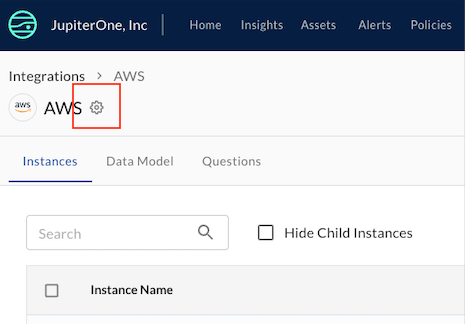Data Source Configuration
Overview
Each JupiterOne integration ingests multiple data sets. Each data set we call a Data Source. This feature allows users to define which Data Sources are enabled or disabled at multiple levels, providing flexibility while maintaining control. The configuration follows a structured hierarchy:
- Integration Defaults – Prescribed by the integration itself.
- Organization Overrides – Organization-wide settings that modify the defaults for an integration (applied only during instance creation).
- Instance-Specific Overrides – Final configuration at the individual instance level.
Defaults and Overrides in Detail
1. Integration Defaults
- Each integration defines a set of Data Sources. Some Data Sources may be enabled by default, while others are disabled.
- These defaults are applied when a new integration instance is created.
- New Data Sources that are added to an existing integration will be disabled by default.
2. Organization Overrides (Applied at Instance Creation)
-
Integration admins can configure Data Sources defaults to override the integration level defaults.
-
Look for the cog icon in the top left corner next to the Integration name to set these Organization level defaults.

-
These overrides only take effect when a new instance is created.
-
After creation, organization settings do not affect existing instances.
3. Parent Instance Overrides (Applied at Child Instance Creation)
- Some integrations, like AWS, GCP, or Azure, support parent-child instances.
- A parent instance can specify its own Data Source configuration.
- These parent instance settings are copied to the children when they are created.
- Once a child instance is created, changes to the parent do not affect it.
4. Instance-Specific Overrides
- After an instance is created, the user can modify Data Source settings as desired.
Example Scenarios
| Layer | Data Source: AWS Glacier Service | Data Source: AWS EC2 Instances |
|---|---|---|
| Integration Default | Disabled | Enabled |
| Organization Override (applied at creation) | Enabled | No Change |
| Parent Instance Override (applied at creation, if applicable) | Disabled | No Change |
| Instance-Specific | Not Changed | Disabled |
| Final Result | Enabled | Disabled |
Key Notes
- Organization Overrides and Parent Instance Overrides are only applied when an instance is created.
- Instance-specific settings are always adjustable within the inherited constraints.